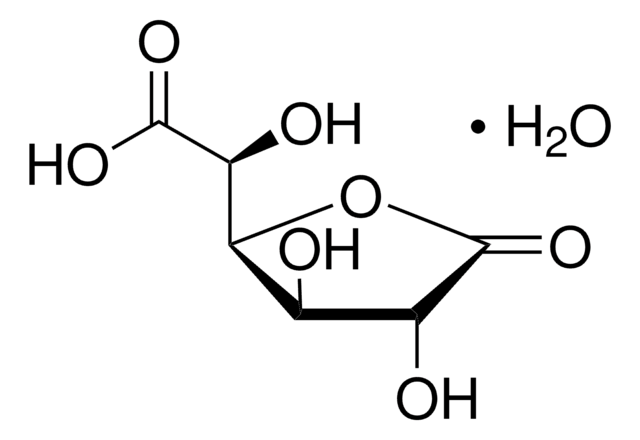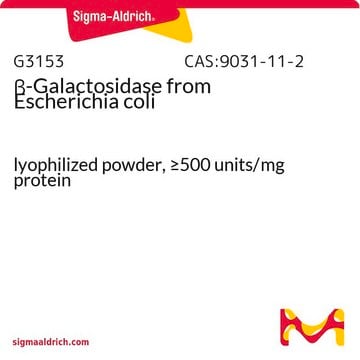I6034
α-L-Iduronidase human
recombinant, expressed in mouse NSO cells
Sinónimos:
IDUA
Iniciar sesiónpara Ver la Fijación de precios por contrato y de la organización
About This Item
Productos recomendados
recombinant
expressed in mouse NSO cells
Quality Level
form
solution
specific activity
≥7,500 units/μg protein
mol wt
83 kDa
impurities
≤1.0 EU/μg Endotoxin
shipped in
wet ice
storage temp.
−20°C
General description
α-L-Iduronidase (IDUA) is mapped to human chromosome 4p16.3. The mature IDUA protein is glycosylated and comprises triosephosphate isomerase (TIM) barrel domain, β-sandwich, helix-loop-helix region and an immunoglobin-like domain. α-L-Iduronidase is classified under glycoside hydrolase (GH) family 39.
Application
α-L-Iduronidase may be used for leukocyte assay in the study of a-L-Iduronidase deficiency in new born.
Biochem/physiol Actions
In lysosomal degradation process α-L-Iduronidase plays a crucial role. It hydrolyzes the non-reducing terminal α-L-iduronic acid residues in glycosaminoglycans (GAGs), including dermatan sulfate and heparan sulfate.
Mutation in the α-L-Iduronidase is implicated in Mucopolysaccharidosis I (MPS I) . This enzyme defect leades to accumulation of dermatan and heparan sulfate . MPS I pathophysiology is accompanied with deformation of the skull, mental retardation and hernias.
Catalyzes the hydrolysis of unsulfated α-L-iduronosidic linkages in dermatan sulfate
Physical properties
Expressed as C-terminal histine-tagged protein (residues 1-653) with a caluclated molecular mass of 71 kDa migrating at ~83 kDa under SDS-PAGE reducing conditions.
Unit Definition
One unit will produce 1 picomole of 4-methylumbelliferone from 4-methylumbelliferyl-α-L-iduronide per minute at pH 3.5 at 25 °C.
Physical form
Supplied as a solution in 40 mM sodium acetate , 400 mM NaCl and 20% (v/v) glycerol, pH 5.0
Storage Class
10 - Combustible liquids
wgk_germany
WGK 1
flash_point_f
Not applicable
flash_point_c
Not applicable
Certificados de análisis (COA)
Busque Certificados de análisis (COA) introduciendo el número de lote del producto. Los números de lote se encuentran en la etiqueta del producto después de las palabras «Lot» o «Batch»
¿Ya tiene este producto?
Encuentre la documentación para los productos que ha comprado recientemente en la Biblioteca de documentos.
Los clientes también vieron
Francesca Gatto et al.
Stem cells and development, 21(9), 1466-1477 (2012-01-28)
Mucopolysaccharidosis type I (MPS IH; Hurler syndrome) is a rare genetic disorder that is caused by mutations in the α-L-iduronidase (IDUA) gene, resulting in the deficiency of IDUA enzyme activity and intra-cellular accumulation of glycosaminoglycans. A characteristic skeletal phenotype is
Vassili Valayannopoulos et al.
Rheumatology (Oxford, England), 50 Suppl 5, v49-v59 (2012-01-11)
Better understanding of disease pathophysiology, improved supportive care and availability of disease-specific treatments for some of the mucopolysaccharidosis (MPS) disorders have greatly improved the outlook for patients with MPS disorders. Optimal management of these multisystemic disorders involves a multidisciplinary team
Xu He et al.
Plant molecular biology, 79(1-2), 157-169 (2012-03-24)
Processes associated with late events of N-glycosylation within the plant Golgi complex are a major limitation to the use of plant-based systems to produce recombinant pharmaceutical proteins for parenteral administration. Specifically, sugars added to the N-glycans of a recombinant protein
Patricia I Dickson et al.
Molecular genetics and metabolism, 106(1), 68-72 (2012-03-10)
Intrathecal enzyme replacement therapy is an experimental option to treat central nervous system disease due to lysosomal storage. Previous work shows that MPS I dogs receiving enzyme replacement with recombinant human alpha-l-iduronidase into the cisterna magna showed normal brain glycosaminoglycan
Haiying Bie et al.
Nature chemical biology, 9(11), 739-745 (2013-09-17)
Mucopolysaccharidosis type I (MPS I), caused by mutations in the gene encoding α-L-iduronidase (IDUA), is one of approximately 70 genetic disorders collectively known as the lysosomal storage diseases. To gain insight into the basis for MPS I, we crystallized human
Nuestro equipo de científicos tiene experiencia en todas las áreas de investigación: Ciencias de la vida, Ciencia de los materiales, Síntesis química, Cromatografía, Analítica y muchas otras.
Póngase en contacto con el Servicio técnico











